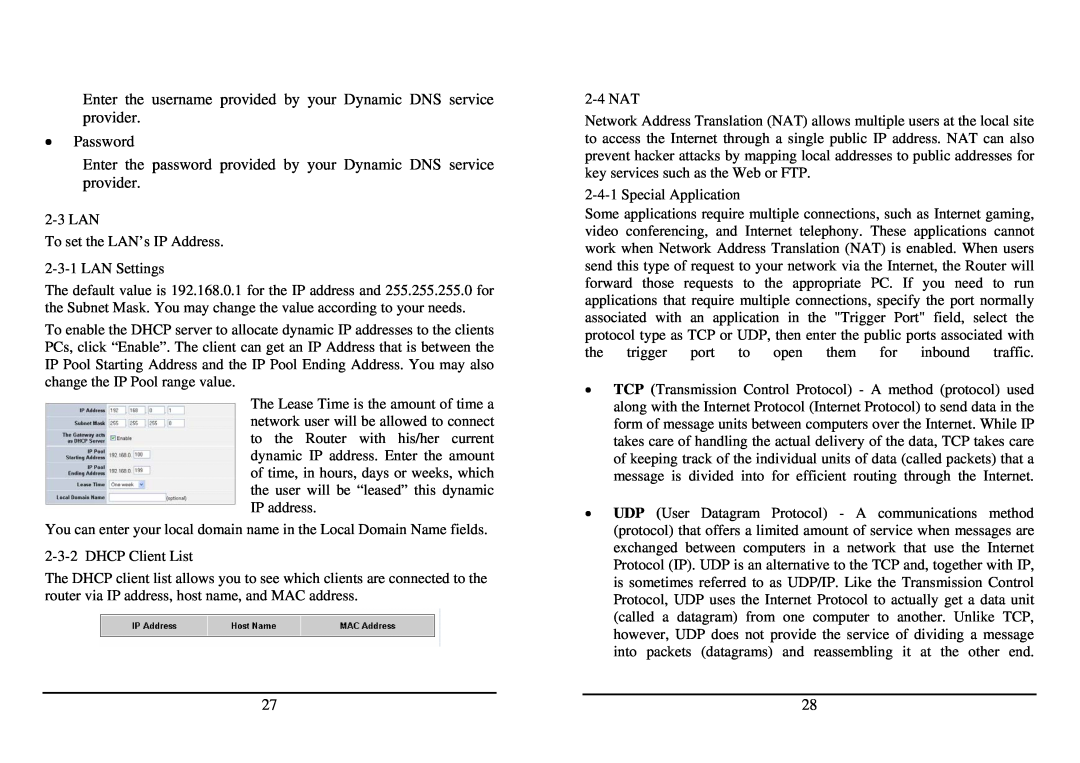
Enter the username provided by your Dynamic DNS service provider.
•Password
Enter the password provided by your Dynamic DNS service provider.
2-3 LAN
To set the LAN’s IP Address.
The default value is 192.168.0.1 for the IP address and 255.255.255.0 for the Subnet Mask. You may change the value according to your needs.
To enable the DHCP server to allocate dynamic IP addresses to the clients PCs, click “Enable”. The client can get an IP Address that is between the IP Pool Starting Address and the IP Pool Ending Address. You may also change the IP Pool range value.
The Lease Time is the amount of time a network user will be allowed to connect to the Router with his/her current dynamic IP address. Enter the amount of time, in hours, days or weeks, which the user will be “leased” this dynamic IP address.
You can enter your local domain name in the Local Domain Name fields.
2-3-2 DHCP Client List
The DHCP client list allows you to see which clients are connected to the router via IP address, host name, and MAC address.
2-4 NAT
Network Address Translation (NAT) allows multiple users at the local site to access the Internet through a single public IP address. NAT can also prevent hacker attacks by mapping local addresses to public addresses for key services such as the Web or FTP.
2-4-1 Special Application
Some applications require multiple connections, such as Internet gaming, video conferencing, and Internet telephony. These applications cannot work when Network Address Translation (NAT) is enabled. When users send this type of request to your network via the Internet, the Router will forward those requests to the appropriate PC. If you need to run applications that require multiple connections, specify the port normally associated with an application in the "Trigger Port" field, select the protocol type as TCP or UDP, then enter the public ports associated with the trigger port to open them for inbound traffic.
•TCP (Transmission Control Protocol) - A method (protocol) used along with the Internet Protocol (Internet Protocol) to send data in the form of message units between computers over the Internet. While IP takes care of handling the actual delivery of the data, TCP takes care of keeping track of the individual units of data (called packets) that a message is divided into for efficient routing through the Internet.
•UDP (User Datagram Protocol) - A communications method (protocol) that offers a limited amount of service when messages are exchanged between computers in a network that use the Internet Protocol (IP). UDP is an alternative to the TCP and, together with IP, is sometimes referred to as UDP/IP. Like the Transmission Control Protocol, UDP uses the Internet Protocol to actually get a data unit (called a datagram) from one computer to another. Unlike TCP, however, UDP does not provide the service of dividing a message into packets (datagrams) and reassembling it at the other end.
27 |
| 28 |
